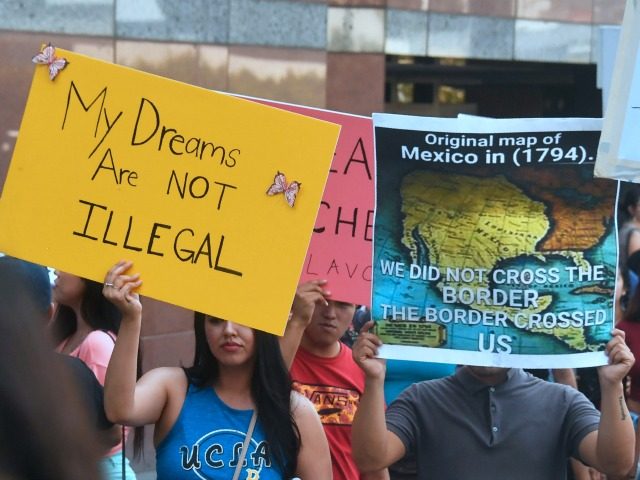Congress’ gridlocked calendar will likely prevent amnesty advocates from reincarnating the DACA program before President Donald Trump formally ends the amnesty in March 2018.
But there’s little chance that a new push will succeed because Congress’ September calendar is packed with must-pass bills. In September, for example, legislators must pass an Obamacare overhaul, a debt-ceiling vote and an aid package for flooded Houston.
Moreover, Trump’s bipartisan anti-amnesty electorate is mobilized, and Democratic legislators remember the painful lesson of the bipartisan “Comprehensive Immigration Reform” in 2013 and 2014. Because of that 2014 mid-year election, the Democrats lost 10 Senate seats, Republican Sen. Mitch McConnell became Majority Leader, and real-estate investor Donald Trump moved closer towards his run for the White House.
The calls for a quick-fire amnesty began late on Sunday when White House officials leaked the news that Trump will let the legally wobbly DACA program end in March 2018. That timeline immediately meant that the party’s Latino and progressive lobbies began a high-temperature push for an amnesty for the 800,000 illegals who now have DACA work permits. Rep. Joaquin Castro sent an early tweet:
Mexican-born, Spanish-language TV anchor Jorge Ramos also cranked up the amnesty campaign, tweeting:
“We are barreling towards a legislative debate,” said Ali Noorani, the executive director of the Soros-backed National Immigration Forum. “A debate that will be won or lost in conservative circles,” he continued:
“Bipartisan legislation with reasonable enforcement measures is possible.
(I’m not saying *how* possible.)
If Breitbart and friends manage to rattle Republican members, the legislation will quickly fade or the enforcement measures will become so draconian as to lose the support of Democrats and the community.
Reality immediately intervened. Ex-GOP Rep. David Jolly tweeted his prediction, saying the GOP leaders can’t keep their base if they join with the corporations and Democrats to push for an amnesty.
New York Times‘ reporter Jonathan Martin shared the skepticism, and pointed out that Congress has very little time to spare in a jammed schedule:
Once Congress has shoved its way through the must-pass items on September’s calendar, it must also pass another set of must-do activities in October. They include the 2018 government budget, plus the border wall, and the tax bill.
Those requirements — especially the budget bills — will slip and slide their way into November and then December, leaving little time for a painful amnesty fight, especially because the voters can make themselves heard and felt during the Thanksgiving and Christmas recesses.
January is for rest and recovery, February is for getting back to the congressional routine, and March is when people start muttering about impending primaries.
The bigger problem for amnesty activists is that Americans really do not want an amnesty, and they’re going to get a vote in 15 months. That’s when ten Democratic Senators will face voters in states which Trump won in November 2o16.
Those ten Senators remember the ten other Democratic Senators who lost their seats in the 2014 midterm elections after voting for the “Gang of Eight” amnesty bill in 2013.
Primaries will arrive in the Spring, and in June 2014, GOP primary voters cremated the “Gang of Eight” amnesty-and-cheap-labor bill by ejecting Rep. Eric Cantor, the GOP’s majority leader in the House. No legislator wants to share Cantor’s fate.
Several of the Democratic Senators facing election in 2018 have already voted against amnesty for the 800,000 DACA recipients in 2010.
Only six GOP legislators signed a pro-DACA proposal — leaving another 23-plus representatives either silent or opposed to a DACA amnesty. GOP nationalists, such as Rep. Steve King will keep emphasizing to their colleagues the unpopularity of any amnesty:
Conservative voters were also quick to show that Congress should put Americans’ dreams against of the DACA illegal immigrants.
Republicans and conservatives will also be pushing their own ideas and improvements in September, October, and November, leaving even less time for the DACA amnesty.
One of those proposals would end tax-breaks for illegal immigrants and the companies which hire them;
But business executives will push hard for a DACA amnesty, partly because it would help avoid a 2018 debate over Trump’s sweeping merit immigration reform, dubbed the RAISE Act. That popular act would shrink the inflow of low skilled immigrants, reduce taxpayer spending that now goes to business groups and also grows wages for Americans.
Business-backed libertarians are already pushing to expand the unpopular DACA amnesty beyond the 800,000 illegals. David Bier, an activist at the Cato Institute, favors a free flow of workers and he urged an amnesty for the children of at least 1 million temporary visa-workers.
Amid all of this, the Democrats’ progressive and ethnic groups within the base will be raising temperatures and tempers with shouts of racism and white supremacy — making it difficult for liberal Republicans or moderate Democrats to maneuver. And without maneuvering room, the result is a legislative gridlock until after the 2018 election.

COMMENTS
Please let us know if you're having issues with commenting.